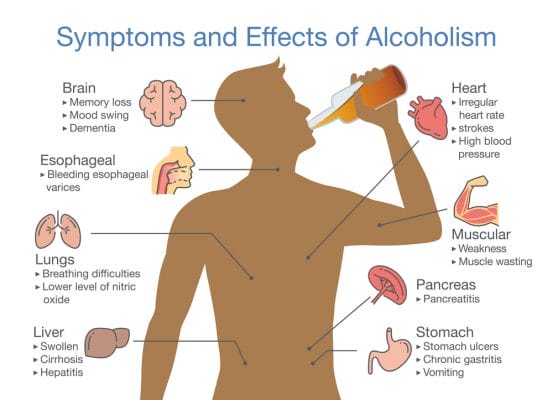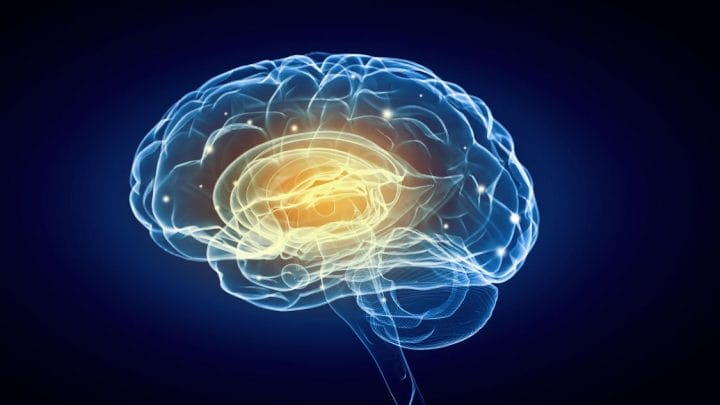
Drinking alcohol – how destructive it is for the human body
Doctors of many specialties have long indicated that one of the most fatal addictions is drinking alcohol. Alcoholism is considered to be a social disease and the number of drinking compatriots, instead of decreasing, keeps growing despite the implementation of numerous programs aimed at reducing the consumption of alcoholic beverages. Drinkers still do not realize that alcohol disease starts with that one beer drunk every day.
Contents
How do we define the concept of alcoholism?

While it is difficult to clearly define the concept of alcoholism, it is considered a serious disease that is extremely difficult to treat. The generally accepted definition is chronic, systematic and compulsive consumption of alcoholic beverages, which in many cases cannot be controlled. The alcoholic begins to drink more and more, becoming more and more dependent and destroying his health, often irreversibly.
Alcoholic disease destroys not only the drinker himself, it also has a destructive influence on his family, spouse and most of all children, who suffer the most in such a situation. Interpersonal relations in the workplace are disturbed, often resulting in job loss, the quality of life decreases and the satisfaction of addiction becomes the top priority.
What are the most common causes of developing alcoholism?
As we have already mentioned, no one becomes an alcoholic right away, it is a longer process that lasts for years. It all starts with the first dose C2H5OHwhich is ethyl alcohol contained in beer, vodka or a glass of wine. At first, an occasional drinker, who drinks once or twice a week for company, seems to be in control, but if the frequency of alcohol consumption increases, it may mark the beginning of addiction.
Crossing this conventional boundary is relatively easy, but the reasons for doing so are more varied, and alcoholism treatment specialists point primarily to:
Medical factors
These may seem strange at first, but only until you realize that alcoholism is the same disease as many others. The pathogenic agent here is alcohol, and the body usually reacts to it with a state similar to euphoria. For most people, drinking brings pleasure and joy, and negative reactions occur only when they stop drinking.
Unpleasant symptoms appear, mostly psychological, depressive or even depressive, often accompanied by physical pain and stomach disorders. Many people find that these symptoms disappear after drinking another portion of alcohol, so they start drinking compulsively to avoid them.
Personality factors
Another reason for the development of alcoholism is personality disorders, and some people have a certain predisposition to fall into this pernicious addiction. Their psyche is weak enough to cope with many daily problems, they see alcohol as a way to escape from them, and increasing drinking can also be caused by:
- emotional immaturity;
- constant feelings of frustration and irritation;
- high levels of aggression, very often turning into verbal or physical assaults on other people, usually their loved ones;
- feeling of loneliness, which can lead to depression, made worse by drinking alcohol;
- a lack of a sense of security;
- low self-esteem and excessive criticism of oneself;
- misconception of masculinity in men, the need to emphasize it by the amount of drunk alcohol, which may be caused by disorders in the level of testosterone, the most important male hormone;
- living in constant stress, the state of strong nervous tension causing an increase in the level of cortisol, or “stress hormone”, and the drinker thinks that alcohol helps to relieve these tensions, relax and unwind, but it only has a short-term effect, and maintaining this dubious mental comfort will mean drinking more and more.
Social factors
Equally common, and reaching for alcohol can be caused by, among other things:
- growing up and being raised in a pathological family where drinking is considered normal and not subject to any criticism;
- Difficulties in breaking free from drinkers who accompany the alcoholic throughout later adult life;
- the desire to impress one’s peers, which usually results in falling into the habit at a very young age;
- various difficulties in adult life, with coping with excessive responsibilities, private and professional.
Genetic factors
Not yet fully proven, but many indications suggest that the tendency to consume large amounts of alcohol can be inherited from older, drinking family members. We are dealing here with a phenomenon similar to the “inher itance” of baldness, therefore, if we want to avoid later health problems, we should learn from an early age to speak up firmly “no” to the proposal of even one beer.
How does alcohol damage our health?

Drinking alcohol has become a serious social problem in many countries of the world, unfortunately affecting not only adults but also children. This is facilitated by the widespread availability of alcoholic beverages, sold in nearly 30 thousand stores in Poland, many of which are open 24 hours a day. The research shows that as many as 16% of our compatriots consume alcohol once a week, 30% once a month and the consumption of pure spirit per capita of a statistical Pole exceeds 11 liters a year. Men still drink more often, but alcoholism among women is also on the rise and the youngest members of such dysfunctional families suffer even more.
These data are indeed alarming, just like the growing costs of treatment of addicts, already counted in billions of zlotys a year. However, alcoholism is not only a matter of money or statistics, first of all it brings serious health consequences, diseases often leading to the death of the addicts. Contrary to what they claim, there is no safe, harmless dose of ethanol, just one glass is harmful, and compulsive drinking negatively affects:
Liver and Pancreas
The liver is one of the most important internal organs , responsible, among other things, for the body’s lipid metabolism, the deposition of essential nutrients, vitamin A, vitamin B, vitamin C, vitamin C, and vitamin C.The liver is one of the most important internal organs, responsible for the body’s lipid metabolism, the deposition of essential nutrients, vitamin A, vitamin D and minerals, the production of bile for fat digestion, and the removal of dangerous toxins and residues from metabolic processes. Unfortunately, the liver is extremely susceptible to the effects of ethanol, which manifests itself in the development of several particularly dangerous diseases:
- Alcoholic steatohepatitis, typical of the early stages of alcoholism, when it is still possible to stop drinking in time and the liver will be able to regenerate itself. Symptoms to be aware of include fatigue, rapid weight loss, lack of appetite, vomiting and a visibly and tangibly enlarged liver;
- alcoholic hepatitis, another stage of its progressive damage, and its symptoms are mainly severe pain in this organ and its swelling, vomiting and nausea, high fever indicating inflammation, jaundice;
- alcoholic cirrhosis of the liver, which is the final stage of alcoholism, when there is practically no salvation for the drinker and one can safely say that by drinking, he sentenced himself to death. Liver damage is irreversible and cirrhosis is manifested by high fever, swollen legs, ascites, esophageal varices and jaundice.
In the case of the pancreas it is also necessary to take into account the almost complete disruptionof its work, especially the processes of insulin production, which increases the risk of developing diabetes. Under the influence of ethanol, epigastric pain, flatulence and nausea with vomiting and diarrhea also occur.
Heart and cardiovascular system
The same as the liver, it is exposed to the destructive influence of alcohol, which, if drunk regularly, can completely disrupt the functioning of the heart muscle and all other components of the cardiovascular system. Reaching for a glass frequently, we must reckon with the development of such life-threatening diseases as:
- arrhythmia, irregular heartbeat;
- supraventricular arrhythmia, or atrial fibrillation;
- Tachycardia, tachycardia, or rapid heartbeat without prior exercise;
- cardiomyopathy, enlargement of the heart cavity;
- anemia, or anemia;
- Higher risk of myocardial infarction;
- atherosclerosis;
- coronary artery disease;
- ischemic stroke.
The digestive system
The next place in the human body that alcohol attacks with all its might, and any dose, even a seemingly small one, may prove harmful to the digestive system. Alcohol almost completely disturbs all digestive processes, so we have to reckon with growing overweight and obesity, it also becomes the cause of numerous ailments and diseases of the digestive system:
- diarrhea, heartburn, vomiting and constipation;
- reflux, the backflow of gastric contents into the esophagus;
- gastritis and duodenitis;
- damage to the mucous membrane lining the inside of the stomach;
- inadequate intestinal microflora;
- bleeding from the digestive tract, which may indicate a stomach or duodenal ulcer.
Brain and nervous system
Compulsive drinking also causes damage to the brain and nervous system, often irreversible. Among other things, drinkers are diagnosed with permanent damage to nerve cells or the connections between them, which manifests itself in increasing sensory disturbances and pain in the limbs. Alcohol also has a negative effect on the psyche, the zones of the brain responsible for rational behaviour are “switched off” and characteristic symptoms appear in an alcoholic:
- mood swings, often going from one so-called extreme to another, from states of euphoria, through attacks of aggression, to depressive states;
- disorders of feeling love or compassion, the so-called higher emotions;
- varying degrees of disruption of cognitive functions, which can be called “declining” intelligence;
- Weakening memory, increasing difficulty in remembering and assimilating new information;
- concentration disorders, inability to focus attention on anything, even on the simplest activities;
- alcoholic psychosis manifested by delusions and hallucinations;
- persecutory mania and Othello’s syndrome, morbid, usually unjustified jealousy of the partner;
- progressive alcoholic dementia.
Potency and erections
A successful intimate life is one of the foundations of our psychological well-being, and we would like to maintain full sexual performance until old age. It’s worth remembering that the biggest enemy of potency, especially for men, is alcohol, after drinking which men may forget about getting or keeping an erection for the entire duration of intercourse. In this case the rule of connected vessels applies, since ethanol disturbs the blood flow, it alsodoes not flow to the penis.
At the same time the sexual stimuli responsible for arousal are dulled, and the pleasure of intercourse can simply be forgotten. The level of sex hormones decreases, estrogen in women and testosterone in men, which in the case of the latter may even end in permanent impotence.
Sources:
- https://www.healthline.com/nutrition/alcohol-good-or-bad
- https://www.healthline.com/health/alcohol/effects-on-body
- https://www.healthline.com/health/facts-about-alcohol
- https://www.healthline.com/nutrition/how-much-alcohol-is-too-much



